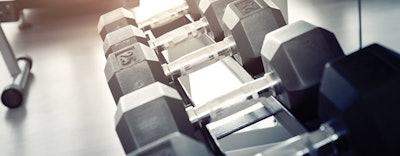
Ensuring that your facility has a good selection of high-quality free weights goes a long way toward satisfying a mainstream clientele that's increasingly interested in strength training. Free weights are also relatively affordable compared to other kinds of equipment and easier to maintain. As functional fitness regimens like CrossFit gain in popularity, gym goers are actively seeking out the simplicity and flexibility of dumbbells, kettlebells, bars and plates. Here are a few things to think about when you're looking to pump up your gym with an array of free weights:
RELATED: Find more solutions for your facility in the Buyers Guide
Benches and racks
If you're going to have a lot of dumbbells, Olympic bars and plates, you're going to need ample apparatuses to support the use and storage of all that equipment. It's important that you consult your provider to ensure you have the space for your free weight purchase, including plenty of utility benches, squat racks and storage racks.
RELATED: Why Gyms Are Offering Strength Training in a Group Setting
Dumbbells and stations
The last thing you want at your gym is a line of people waiting to use the free weights, so it's important to ensure you have enough space and weights to serve your clients' needs. Dumbbell runs are usually stored on racks in pairs and in increments of five or 10 pounds, and quantity will depend on your available space and the number of clients you expect to frequent your gym during peak usage hours. For reference, a typical "big box" gym might have anywhere from 60 to 80 pairs of dumbbells. The same advice goes for Olympic stations — space should dictate how many stations you'll be able to accommodate, and clientele should inform how many you actually need.
RELATED: Product Spotlight 2018: Weight Rooms & Strength Equipment
Coated or uncoated plates
Urethane-coated plates and dumbbells have become the norm in gyms today, but they're also slightly more expensive than rubber-coated or uncoated plates. Rubber leaves scuffs on walls and floors, and tears more easily than urethane. Both rubberized and urethane-coated plates are typically considered safer than exposed iron. They're also quieter when loaded on the bar, stacked in storage or dropped, and they come in a variety of colors that can be worked into the overall aesthetic of your gym. Moreover, custom logos on free weights can effectively communicate branding within a commercial or institutional weight room.
Quality
For the most part, it's best to stay away from moving parts in your free weights. Dumbbells and bars are exposed to aggressive use, and any bolt, end-cap or screw could become a problem over the lifespan of the unit.
Warranty
Free weights are durable, but they also take a beating over their lifespan. A five-year warranty is standard on premium equipment, while two-year warranties are typical on more entry-level equipment.
This article originally appeared in the October 2018 issue of Athletic Business with the title "Purchasing Guide" Athletic Business is a free magazine for professionals in the athletic, fitness and recreation industry. Click here to subscribe.




































